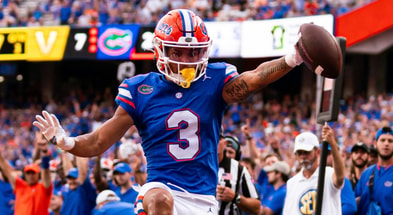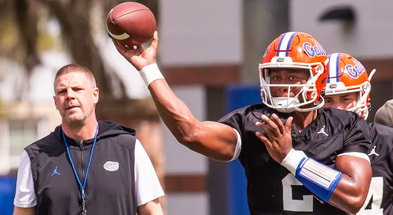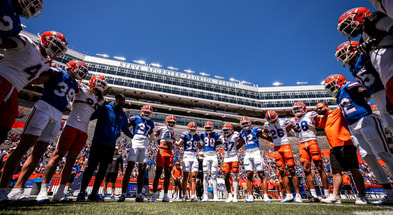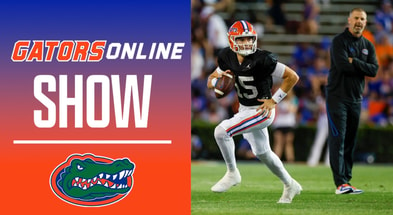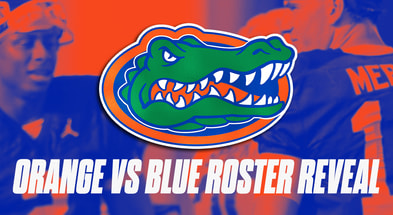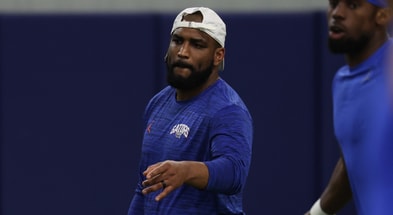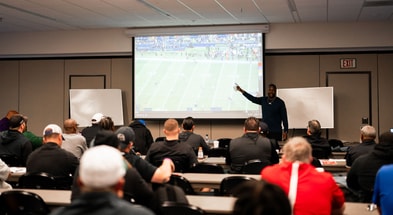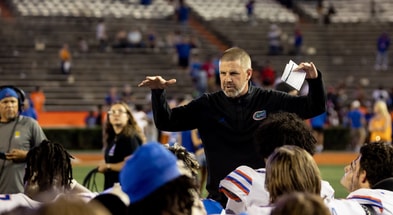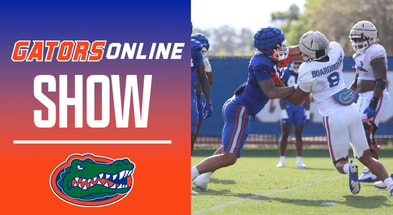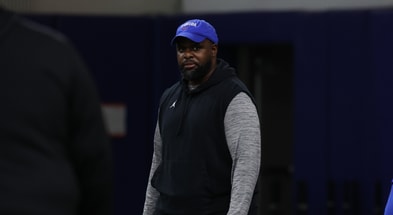Scott Stricklin weighs in on NIL inducements, calls for Congressional action
With name, image and likeness creating an unfair and unregulated playing field in college sports, Florida athletic Scott Stricklin is counting on the United States Congress to act.
When a uniform interim NIL policy was adopted July 1, President Mark Emmert said the NCAA would continue to work with Congress to “create a single, national law on NIL” and develop a solution that will provide clarity.
More than 10 months later, there’s been no progress on that front.
“Congress has not had any appetite to do that,” Stricklin said during his appearance with Steve Russell on WRUF radio. “They’ve talked about it. They’ve had hearings. They’re interested, but they’ve not done anything about it, and it doesn’t appear they’re going to. So, we’re left with this really awkward new world where the game has changed, and the rules of engagement have changed.”
The rules have not only changed, but are applied loosely with little enforcement and the potential for abuse. College coaches such as Florida State’s Mike Norvell and Pitt’s Pat Narduzzi have accused other schools of tampering and trying to induce players with NIL deals.
“The NCAA I think has three pretty broad rules (for NIL). One is it can’t be for an inducement to attend an institution; it can’t be a reward for competition; and the young person getting the NIL has to do something for the payment. But that’s really the extent of the rules,” Stricklin said. “How do you determine what someone considers an inducement or doesn’t? There are some really obvious examples that you could say. ‘Hey, if you come here, we’ll pay you X’, that would be an inducement.
“If you were a star player and a coach said to you, ‘You know, other guys who are here playing your position having the kind of success that we think you’re going to have, they’re making X. We could totally see you being as good as that guy.’ Is that an inducement? I don’t think it is. I think that’s kind of what’s happening.”
Three paths forward
Less than a week after college leaders pushed the NCAA to enforce new NIL guidelines and start investigating recruiting violations, the NCAA Board of Directors sent out new guidance Monday to its Division I membership clarifying the current rules and prohibiting boosters from recruiting.
After unanimously ruling that NCAA restrictions on “education-related benefits” for college athletes violated antitrust law, the Supreme Court of the United States laid out three options for the future of collegiate sports.
“There’s three paths forward. We can continue what we’re doing, which name, image and likeness is part of that and a very free market approach to college athletics,” Stricklin said. “It can collectively bargain, which would require every student-athlete to be an employee and have union and go through all that. And there’s a lot of layered complications to that. One of which is, in several states in the country, Florida being one of them, union activity such as a work stoppage is not legal to take place. And so that kind of takes away the opportunity for there to be a union that would have any teeth to it.
“And then the third thing is have a congressional action. To have a law in place that basically codifies, this is what college athletics is going to be and this is the expectations of those who participate in it from an institution standpoint to student-athletes and everyone else. … The good folks in Washington D.C. could come up with a set of parameters and pass a law that we all fall under. That doesn’t appear to be close to happening.”
If Congress continues to drag its feet, the NCAA will be forced to enact more guidelines to regulate NIL. However, it must remain in accordance with antitrust laws after the Supreme Court’s ruling.
“I hear all the time from media people and fans saying, ‘The NCAA needs leadership to do something about it.’ Well, the Court basically said you’re not allowed to do anything about it. Because if you do, you’re going to open yourself up to antitrust lawsuits,” Stricklin said. “And by the way, when you lose one of those, the damages are tripled. So, that’s a really strong deterrent to not come up with a set of rules on how this thing should work.”
Record fundraising year
Regardless of what rules are in place, Stricklin is confident that UF will not be at a disadvantage with initiatives such as Gator Collective and Gator Guard setting the standard in the NIL space.
Gator Collective is an official partner of Florida Athletics and expects to sign nearly 70 players to NIL deals after a $5 million donation from Gator Guard, which is led by longtime UF donor Hugh Hathcock.
“There’s now a way that your current student-athletes who are on your roster can benefit from NIL payments. And we want the student-athletes at the University of Florida to have as much success in this space as they possibly can. And we’re going to do everything we can to help them accomplish that within the rules,” Stricklin said. “I can’t imagine any rule or any structure of rules that the University of Florida — with our 400,000 living alumni in a state of 21 million people and one of the most recognizable brands in the entire country, if not the world — wouldn’t be really well positioned to take advantage of.
“And we’re blessed that we have great support, not just from an NIL space but from a regular fundraising standpoint. We’re going to have a record year this year in fundraising, and I use that as an example to point out that we have a lot of people who are really passionate about the Gators. And whether that’s people who send $10 a month or people who are in a position in life where they can write checks for substantially larger amounts, we’re really blessed to have a passionate group of fans that want to support us. And I think whether that’s helping build buildings or support scholarships or endowed professorships on campus or help young people with name, image and likeness opportunities, the Gators are going to be well-positioned for success.”
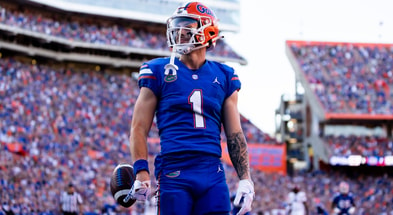
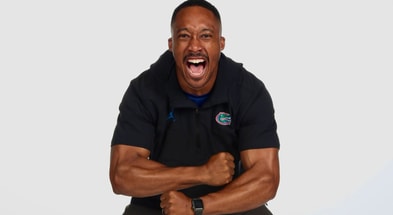
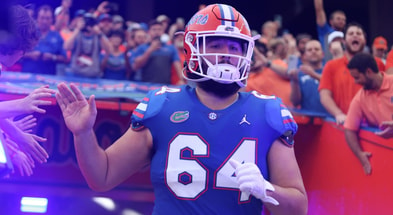
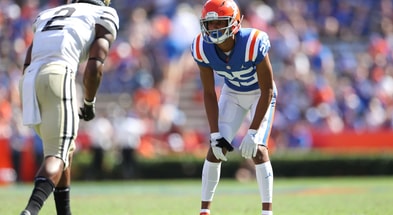
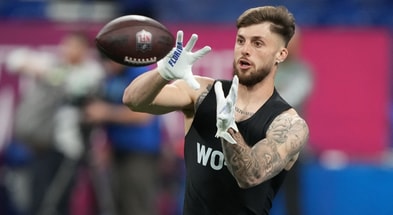
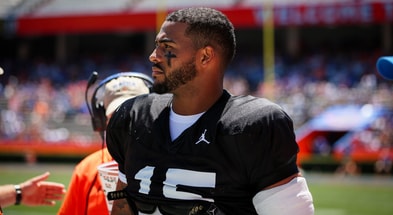

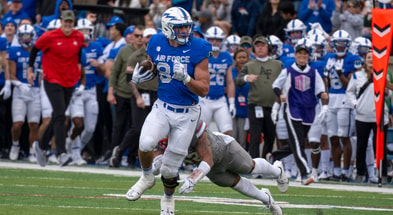
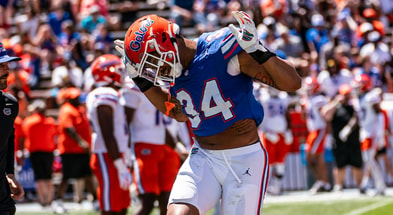
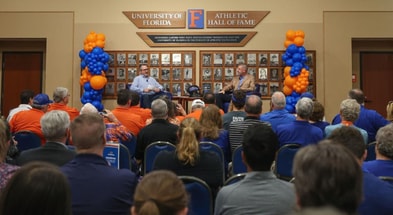
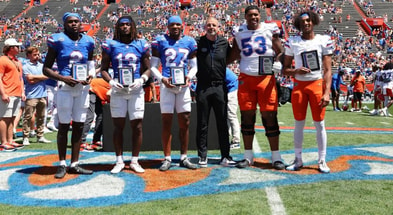
![Florida Gators head coach Billy Napier celebrates with Florida Gators wide receiver Aidan Mizell (11) after a touchdown during the first half at the Orange and Blue spring football game at Steve Spurrier Field at Ben Hill Griffin Stadium in Gainesville, FL on Saturday, April 13, 2024. [Matt Pendleton/Gainesville Sun]](https://on3static.com/cdn-cgi/image/height=215,width=393,quality=90,fit=cover,gravity=0.5x0.5/uploads/dev/assets/cms/2024/04/13155133/Untitled-design-65-2.png)
